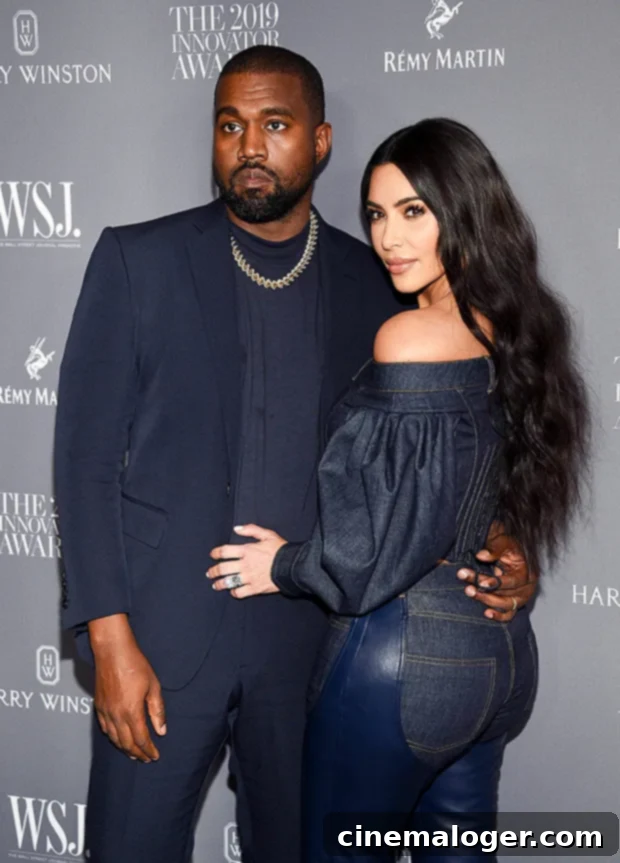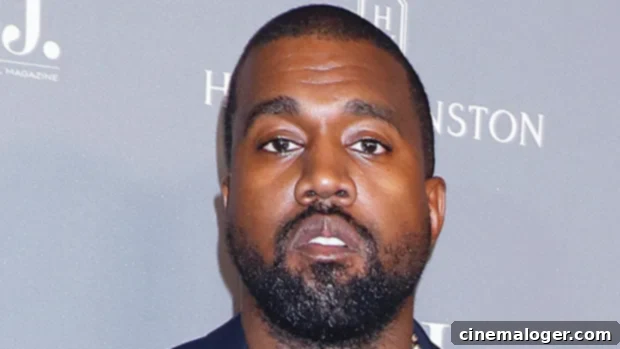Kanye West’s Tumultuous Presidential Bid: Unpacking Anti-Planned Parenthood and Anti-Vaxxer Claims
In a dramatic turn of events that sent shockwaves across the political and entertainment landscapes, music mogul and fashion icon Kanye West announced his intention to run for President of the United States in 2020. This unexpected declaration was swiftly followed by a series of highly controversial statements made during a sprawling interview with Forbes, where West delved into his political ideologies, religious convictions, and startling conspiracy theories. Among the most contentious of these claims were his assertions regarding Planned Parenthood and his deeply skeptical views on vaccinations, both of which immediately ignited widespread debate and drew sharp criticism from various sectors, including healthcare organizations and his own family members.
The interview, described as “four rambling hours,” offered the public a first glimpse into the mind of a presidential hopeful whose platform seemed as unconventional as his candidacy. West’s remarks about Planned Parenthood, in particular, sparked outrage and concern. He explicitly stated his “pro-life” stance, framing it within a religious context: “I am pro-life because I’m following the word of the bible,” he declared. However, he then escalated his position with a deeply troubling conspiracy theory, asserting, “Planned Parenthoods have been placed inside cities by white supremacists to do the Devil’s work.” This claim, which suggests a racially motivated agenda behind the establishment of reproductive health clinics, was met with immediate and strong condemnation.
Kanye West Doubles Down on Pro-Life Stance Amidst Controversy
Following his initial comments in the Forbes interview, Kanye West continued to amplify his “pro-life” position. On July 8, 2020, he took to Twitter to reinforce his perspective, sharing a screenshot of a Google search that displayed images of a 6-month-old fetus. Overlaid on this image, West wrote, “These souls deserve to live.” While the tweet was soon deleted, it served as a further indication of his unwavering commitment to his anti-abortion views and his willingness to use provocative imagery to convey his message. This public display of his personal beliefs underscored the seriousness with which he approached the issue, despite the backlash his earlier statements had already generated.
The implications of West’s statements were profound, especially given their timing during a nascent presidential campaign. His entry into the political arena as a third-party candidate immediately brought a unique and often unpredictable element to the 2020 election cycle. His rhetoric, particularly on such sensitive social issues, positioned him squarely against established political norms and even against the publicly known views of his wife, Kim Kardashian. The confluence of his celebrity, political aspirations, and controversial viewpoints ensured that his every word was scrutinized, creating a firestorm of media attention and public discussion.
Planned Parenthood Responds to “Black Genocide” Claims
The accusations leveled against Planned Parenthood by Kanye West did not go unchallenged. The organization, a leading provider of reproductive healthcare, swiftly issued a powerful rebuke through Nia Martin-Robinson, its Director of Black Leadership and Engagement. In a meticulously crafted statement, Martin-Robinson addressed West’s “outlandish remarks” head-on, emphasizing the autonomy of Black women over their own bodies and healthcare decisions. “Black women are free to make our own decisions about our bodies and pregnancies, and want and deserve to have access to the best medical care available,” she stated, directly countering the narrative that Planned Parenthood somehow preys on or is designed to harm Black communities.
Martin-Robinson further dismissed West’s insinuation as “offensive and infantilizing,” explicitly stating, “Any insinuation that abortion is Black genocide is offensive and infantilizing.” She underscored that the true threats facing Black communities are not from reproductive healthcare providers but from systemic issues: “The real threat to Black communities’ safety, health, and lives stems from lack of access to quality, affordable health care, police violence and the criminalization of reproductive health care by anti-abortion opposition.” This response effectively reframed the conversation, redirecting attention to the genuine disparities and injustices that impact Black lives, while affirming Planned Parenthood’s role in providing essential services to all, including marginalized communities. The organization’s quick and firm stance aimed to dispel misinformation and defend its mission against what it perceived as baseless and harmful allegations.

Contrasting Views: Kim Kardashian and Her Sisters’ Support for Planned Parenthood
The stark contrast between Kanye West’s anti-Planned Parenthood stance and the deeply held beliefs of his wife, Kim Kardashian, and her sisters, Khloe and Kourtney, quickly became a focal point of public discussion. Fans of their reality show, Keeping Up With The Kardashians, would recall a significant episode from 2017 where the sisters openly voiced their support for the organization. This public display of solidarity for Planned Parenthood demonstrated a profound disagreement with the views Kanye West would articulate years later. The Kardashians’ visit to a Planned Parenthood clinic was not merely a passive endorsement; it was an active and visible demonstration of their commitment to reproductive rights and healthcare access.
At the time, Kim Kardashian took to Instagram to share her experience and to champion the organization. Her post read, in part: “My sisters and I visited Planned Parenthood recently and learned that the House of Representatives forced through a bill that strips health care coverage from millions of people and raises health care costs, including Planned Parenthood patients.” She further emphasized the vital role the organization plays for countless individuals: “They are such an amazing place that provides so much to so many! #istandwithpp.” This powerful statement from a major celebrity like Kim Kardashian served to elevate awareness and mobilize support for Planned Parenthood, highlighting its broad range of services beyond abortion, which include contraception, STI testing and treatment, cancer screenings, and general primary care. Her public advocacy for the organization placed her in direct opposition to the conspiracy theories and accusations put forth by her husband, creating an undeniable tension within the family’s public narrative and sparking speculation about the impact on their personal relationship.
View this post on InstagramMy sisters and I visited Planned Parenthood recently and learned that the House of Representatives forced through a bill that strips health care coverage from millions of people and raises health care costs, including Planned Parenthood patients. 😢They are such an amazing place that provides so much to so many! #istandwithpp
A post shared by Kim Kardashian West (@kimkardashian) on
Kanye West’s Anti-Vaxxer Allegations and “Mark of the Beast” Theory
Beyond his controversial remarks on Planned Parenthood, Kanye West’s Forbes interview also served as a platform for him to articulate his deeply held anti-vaccination beliefs, adding another layer of controversy to his nascent presidential campaign. His statements on vaccines were both alarming and conspiratorial, reflecting common tropes within the anti-vaxxer movement while infusing them with his unique religious and apocalyptic interpretations. He expressed grave concerns about the safety and efficacy of vaccines, particularly in relation to children. “It’s so many of our children that are being vaccinated and paralyzed,” West claimed, echoing unsubstantiated fears often circulated by anti-vaccine advocates.
West further connected his anti-vaccination stance to broader, more sinister global conspiracies. When discussing potential solutions for the COVID-19 pandemic, which was a pressing global crisis at the time, he stated, “So, when they say the way we’re going to fix COVID is with a vaccine, I’m extremely cautious. That’s the mark of the beast.” This reference to the “mark of the beast,” a concept drawn from Christian eschatology, positioned vaccination as a spiritual transgression and a tool of malevolent forces. He elaborated on this by suggesting that vaccines were part of a larger scheme to control humanity: “They want to put chips inside of us, they want to do all kinds of things, to make it where we can’t cross the gates of heaven.” While he clarified that “they” referred to “the humans that have the Devil inside them,” his statements resonated with a segment of the population that harbors deep distrust of medical institutions and governmental authority.
The rapper’s strong views on vaccines also tied into his personal health narrative. During the same interview, Kanye West revealed that he had contracted the coronavirus earlier in 2020. This personal experience with the virus seemingly reinforced his skepticism about conventional medical solutions and pharmaceutical interventions, leading him to double down on his anti-vaccine rhetoric. His comments on vaccination were not merely casual observations but were presented as profound convictions, deeply rooted in his spiritual and philosophical framework. The finality of his statement, “Next question,” after outlining his fears about vaccines and their potential to prevent people from reaching heaven, indicated his unwavering belief in these theories and his readiness to move past any challenge or debate on the topic.
The Broader Impact of Kanye West’s Controversial Statements
Kanye West’s entry into the 2020 presidential race, coupled with his outspoken and often inflammatory comments on issues like Planned Parenthood and vaccinations, created a complex and multifaceted public reaction. His celebrity status ensured that his words garnered massive attention, transforming his personal beliefs into national talking points. The immediate backlash from healthcare organizations, public health experts, and a significant portion of the public highlighted the dangers of promoting misinformation, especially during a global health crisis and on sensitive social issues.
The political implications of his candidacy, while ultimately not leading to a significant electoral challenge, were nonetheless noteworthy. His presence in the election cycle added an element of unpredictability and further blurred the lines between entertainment and serious political discourse. For many, his statements were not just controversial; they were perceived as irresponsible, potentially swaying public opinion on critical health and social policies without factual basis. The stark contrast between his views and those of his influential wife, Kim Kardashian, also sparked broader conversations about family dynamics, ideological differences within relationships, and the challenges faced by public figures navigating divergent personal and political landscapes.
In conclusion, Kanye West’s 2020 presidential bid was defined not only by his surprising announcement but by the controversial statements he made regarding Planned Parenthood and vaccinations. His “pro-life” stance, coupled with a conspiracy theory about the organization’s origins, and his “mark of the beast” anti-vaxxer comments, generated a whirlwind of debate. These pronouncements drew strong rebukes from organizations like Planned Parenthood and stood in stark opposition to the publicly documented views of his own family. The episode served as a powerful reminder of the intersection of celebrity, politics, and the profound impact of unchecked claims on public discourse and understanding.
